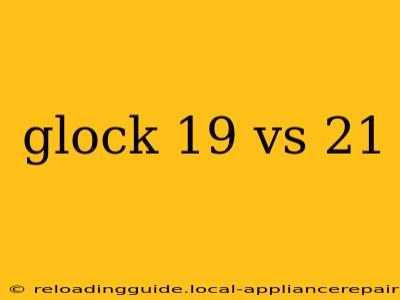Choosing between the Glock 19 and Glock 21 often comes down to personal preference and intended use. Both are highly reliable and popular handguns, but they cater to different needs. This in-depth comparison will help you decide which Glock best suits you.
Caliber and Capacity: The Core Difference
The most significant difference lies in caliber and subsequent magazine capacity. The Glock 19 chambers the ubiquitous 9x19mm Parabellum (9mm Luger), while the Glock 21 fires the powerful .45 ACP. This difference impacts recoil, stopping power, and ammunition availability.
-
9mm (Glock 19): Offers higher magazine capacity (typically 15 rounds), lower recoil, and generally more affordable ammunition. Its smaller size contributes to improved concealability. The 9mm round's popularity translates to widespread availability of ammunition and aftermarket accessories.
-
.45 ACP (Glock 21): Delivers significantly more stopping power per shot due to its larger diameter and heavier bullet weight. However, it boasts a lower magazine capacity (typically 13 rounds), more noticeable recoil, and generally higher ammunition costs. While still popular, .45 ACP ammunition might be slightly less readily available in certain regions compared to 9mm.
Size and Weight: Concealability and Carry
The Glock 19's smaller size and lighter weight make it a popular choice for concealed carry. The Glock 21, being considerably larger and heavier, is less ideal for everyday concealed carry, though it remains manageable for those comfortable with a larger firearm.
-
Glock 19: More compact and lightweight, offering better concealability for everyday carry, especially in warmer months or with less bulky clothing.
-
Glock 21: Larger and heavier, less suitable for everyday concealed carry unless you are experienced in carrying larger handguns. It might be preferred for open carry or home defense where concealability is not a primary concern.
Recoil and Shootability: A Matter of Experience
The noticeable difference in recoil between the two models significantly impacts shootability, especially for newer shooters.
-
Glock 19: Lower recoil makes it easier to control, especially during rapid firing, making it better suited for less experienced shooters or those who prioritize accuracy over raw stopping power.
-
Glock 21: The .45 ACP round's substantial recoil requires more practice and strength to manage effectively. Experienced shooters may find the recoil manageable, but beginners might struggle with accuracy and control.
Ammunition Cost and Availability: A Budgetary Consideration
The cost and availability of ammunition are crucial factors to consider.
-
Glock 19 (9mm): Generally more affordable and readily available than .45 ACP ammunition, making it a cost-effective option for frequent practice and training.
-
Glock 21 (.45 ACP): .45 ACP ammunition tends to be more expensive and may be less readily available in certain areas, potentially impacting training frequency and overall cost of ownership.
Conclusion: The Right Glock for You
The "better" Glock depends entirely on your individual needs and preferences. The Glock 19 excels in concealability, affordability, and ease of shooting, making it ideal for concealed carry and everyday use. The Glock 21 provides superior stopping power but sacrifices concealability, affordability, and ease of use. Consider your experience level, intended use (concealed carry, home defense, range shooting), and budget when making your decision. Ultimately, the best way to choose is to handle both firearms and determine which one feels best in your hand and best fits your needs.

